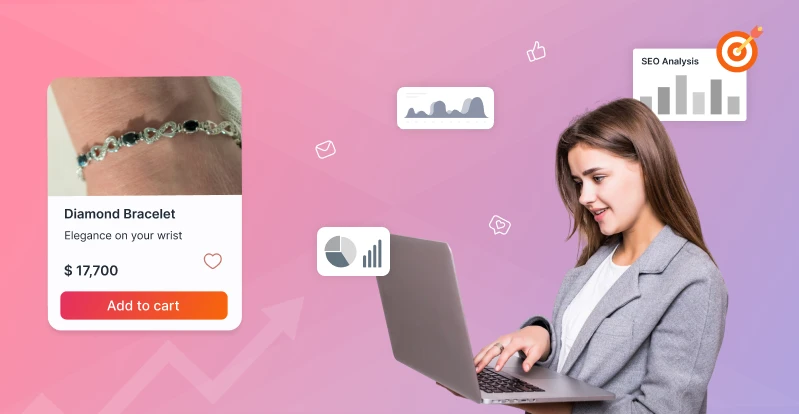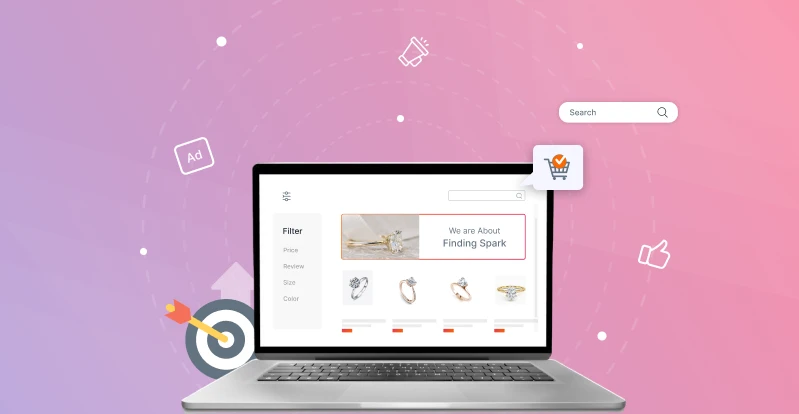Proven SEO Tips to Elevate Your Jewellery Business For Driving Success

Table of Contents
In the sparkling world of jewellery retail, having a beautiful product isn’t enough. Whether you’re an independent jeweller in Brighton or a well-established name in Hatton Garden, if your online shop isn’t visible on Google, your ideal customers won’t find you.
The jewellery market is projected to generate a revenue of US$5.23bn in 2025, which will eventually increase the need for higher visibility.
That’s where Jewellery SEO comes in as a powerful tool to help your business stand out, attract quality traffic, and convert browsers into loyal buyers.
This comprehensive UK-centric blog will walk you through everything you need to know to optimise your jewellery website for search engines, ensure it appeals to local buyers, and ultimately grow your online presence and sales.
Key Benefits of SEO for Your Business
Drive High-Quality Organic Traffic
SEO brings in traffic from users actively searching for products or services you offer. This means they already have the intent to purchase.
When your jewellery eCommerce store ranks well for relevant keywords like “sapphire earrings UK” or “vintage gold bangles,” you attract a targeted audience. These are not just casual browsers, they’re buyers seeking what you sell.
By appearing in top search results, you’ll gain visibility where it matters, increasing the chances of sales without spending on paid ads every month.
Build Long-Term Brand Authority
A strong SEO strategy helps your jewellery brand earn credibility in the eyes of both customers and search engines. High-ranking content, consistent blogging, backlinks from reputable UK websites, and reviews all build domain authority.
Over time, your brand becomes a trusted source in your niche. When shoppers repeatedly see your store in search results, it creates brand recognition and confidence, increasing the likelihood of clicks and conversions. SEO positions you as a leader in a competitive marketplace.
Maximise Return on Investment (ROI)
Unlike paid advertising, which stops producing results the moment you stop paying, SEO has a compounding effect over time. Once your jewellery site ranks for valuable keywords, you’ll continue to attract traffic without ongoing costs per click. Yes, SEO takes effort upfront, but its returns grow long-term. You reduce customer acquisition costs while building sustainable visibility.
For small to mid-size UK jewellers, SEO is a cost-effective marketing channel that delivers measurable, high-ROI performance over time.
Capture Local and Mobile Shoppers
Local SEO ensures you appear when UK shoppers search for terms like “jewellery store near me” or “wedding rings Glasgow.” By optimising your Google Business Profile, getting reviews, and using localised keywords, you’ll drive footfall and online sales.
Combined with mobile optimisation, you reach users browsing on phones, especially during commutes or in-store comparisons. Today’s buyer journey is hyperlocal and mobile-driven, so SEO helps you stay relevant and accessible at the moment of intent.
Improve User Experience and Engagement
Google’s ranking factors increasingly favour sites that deliver excellent user experience. SEO helps you improve site speed, navigation, and mobile responsiveness, all of which keep users on your site longer.
When customers easily find what they need, they’re more likely to browse, add to cart, and buy. By optimising product descriptions, images, and structure, SEO enhances your site’s usability. Happier users lead to lower bounce rates, more conversions, and improved search rankings for creating a win-win for business and buyer.
Stay Ahead of Your Competitors
If your competitors are investing in SEO and you’re not, you risk falling behind. But if you optimise strategically, using detailed product pages, blogs, and link-building—you can outrank even larger players.
Track competitor keywords, analyse backlinks, and identify gaps where your brand can shine. SEO is a long game, but with persistence, it can level the playing field. For small and independent UK jewellers, smart SEO is a way to outperform big-budget brands organically.
Why Your Jewellery Business Needs SEO
In today’s digital-first UK retail landscape, simply having a stunning collection isn’t enough for your ideal customers need to find you online before they even step into a shop or add to cart.
This is where SEO becomes a critical investment for any jewellery business. With more than 89% of consumers starting their buying journey on search engines like Google, showing up on page one is no longer optional; it’s essential.
SEO helps your business stand out in a saturated market. Whether you’re selling handmade bangles in Birmingham or vintage engagement rings in London, strategic optimisation ensures your website ranks for terms that matter, like “bespoke diamond rings UK” or “ethical gold jewellery.” It builds visibility, authority, and trust.
SEO isn’t just about attracting traffic, it’s about drawing the right traffic. It helps potential customers find what they’re looking for faster, improving your chances of conversions.
And unlike paid ads, organic SEO offers sustainable results over time. In short, investing in jewellery SEO is investing in your brand’s long-term online success.
Tips to make your Jewellery Business SEO Friendly
Understand the UK Jewellery Market Landscape
The UK jewellery market is worth over £5 billion and continues to grow, with more consumers choosing to shop online. Understanding local preferences is key for British buyers who often prioritise trust, craftsmanship, and ethical sourcing.
Online competition is fierce, so aligning your strategy with UK consumer expectations boosts credibility and appeal. Local SEO is essential, especially if you run a high-street shop or sell at events. Knowing your market helps refine your messaging, visuals, and keyword targeting for better conversion rates.
In-Depth Keyword Research
Effective SEO begins with knowing what your audience searches for. In the UK, always use British spellings like “jewellery” and regional terms such as “bespoke” instead of “custom”.
Keyword tools like Ahrefs, SEMrush, and Google Keyword Planner help uncover terms like “platinum wedding rings UK” or “ethical engagement rings London”.
Use modifiers such as location or material type to target niche searches. Aim for a mix of high-volume terms and long-tail queries to draw relevant traffic to your site.
On-Page SEO
Every page on your website should be optimised with SEO best practices. Use clear title tags and compelling meta descriptions that include your target keywords. Incorporate headers and subheaders (H1, H2, H3) to break up content and improve readability.
Image alt text is critical for describing each product in detail using keyword-rich language. Keep URLs short and descriptive, for example, /bracelets/gold/vintage.
Well-optimised pages help search engines index your content correctly while also offering a better experience for your human visitors.

Mobile Optimisation
With over 62% of jewellery searches happening on mobile in the UK, mobile optimisation is vital. Use responsive design so your site displays beautifully across all devices.
Page speed is crucial for compressing images, enabling caching, and minimise code to ensure fast load times. Simplify navigation with clear menus and large tap-friendly buttons. Autofill forms, minimise text input, and streamline checkout to reduce drop-offs.
A mobile-first approach ensures you capture and convert shoppers browsing on the go or during downtime.
Content Marketing
Content marketing builds authority and draws organic traffic. Create a blog featuring helpful articles like “How to Choose an Engagement Ring” or “Caring for Your Silver Jewellery”.
Use UK-specific language and cultural references to connect with local readers. Develop content pillars on key topics like ethical sourcing, jewellery trends, or gemstone guides.
Offer advice tailored to British consumers, e.g., VAT details or UK shipping options. Strategic content positions your brand as a trusted expert and nurtures customer loyalty over time.
Local SEO
Local SEO is essential for UK jewellers with a physical presence. Start by creating or optimising your Google Business Profile with consistent NAP (Name, Address, Phone) details. Include high-quality photos, product listings, and accurate business hours.
Register your business on UK directories such as Yell, FreeIndex, and Scoot to build local citations.
Encourage happy customers to leave reviews on Google or Trustpilot, and respond in professional UK English. Local SEO makes your shop discoverable by nearby shoppers and boosts foot traffic.
Link Building
Backlinks signal authority to search engines and help your pages rank higher. Reach out to UK fashion and lifestyle bloggers for product reviews, guest posts, or collaborations.
Offer to sponsor local charity events or craft fairs in exchange for mentions. Create shareable content like infographics or guides about jewellery care or style trends. Submit your website to UK-based directories and forums.
Avoid spammy link schemes, for focus on earning links from high-quality, relevant sites to improve your site’s credibility and SEO.
Technical SEO
Technical SEO ensures search engines can efficiently crawl and index your site. Start by fixing broken links and redirecting 404 errors using tools like Screaming Frog or Ahrefs.
Implement structured data (Schema.org) for products, breadcrumbs, and FAQs to enable rich search results. Secure your site with HTTPS to protect user data and build trust.
Monitor Core Web Vitals, like LCP, FID, CLS, to enhance performance. A technically sound website ranks better, provides smoother user experiences, and supports long-term SEO efforts.
Analytics & Continuous Improvement
Track your SEO progress with tools like Google Analytics 4 and Search Console. Identify which pages drive the most traffic, where users drop off, and which keywords convert.
Monitor click-through rates, bounce rates, and session duration to assess engagement. Use heatmaps to understand user behaviour and test improvements via A/B testing.
Regularly audit your content and update underperforming pages. SEO is not a set-it-and-forget-it task; for continuous analysis and optimisation keep your site performing well in an evolving digital landscape.
Social Media & SEO
While social media signals aren’t direct ranking factors, platforms like Instagram and Pinterest help distribute content and attract backlinks.
Share your blog posts, product launches, and behind-the-scenes videos with branded UK hashtags like #BespokeJewelleryLondon.
Collaborate with British influencers to extend your reach and build trust. Use social proof and user-generated content to enhance authenticity. Social channels drive traffic to your site, improve brand awareness, and support off-page SEO by encouraging shares, mentions, and engagement within your target market.
Voice Search & Featured Snippets
With the rise of voice assistants, optimising for voice search is a smart move. Use conversational phrases and answer-based formats to match how people speak.
Focus on FAQs like “What’s the best metal for wedding rings?” or “How do I clean gold jewellery?” Structure content for featured snippets, for short, direct answers that Google can display. Include schema markup where applicable.
Voice search is especially useful for mobile users, so ensure your content is concise, relevant, and naturally written for verbal queries.
Invest in Product Reviews & Testimonials
Reviews play a crucial role in both SEO and customer trust. Positive reviews on platforms like Google, Trustpilot, or even product-specific feedback on your site improve click-through rates and conversions.
Search engines consider user-generated content like reviews as fresh content that boosts page relevancy. Encourage UK customers to leave detailed feedback and respond to it professionally.
Showcase testimonials on product and landing pages to add credibility. This not only improves SEO but also builds trust with new and returning visitors.
Use High-Quality Visuals
Jewellery is visual by nature, so use crisp, high-resolution images that showcase your products beautifully. Optimise file sizes for fast loading without compromising quality.
Include descriptive alt text with target keywords for each image to support SEO. Use 360-degree views or lifestyle shots to engage visitors.
Videos are also beneficial for SEO, therefore it’s important to consider short clips showing how pieces look when worn. Attractive visuals reduce bounce rates, increase time on site, and provide a richer shopping experience for UK buyers.
Prioritise E-E-A-T (Experience, Expertise, Authoritativeness, Trustworthiness)
Google’s ranking algorithm increasingly favours content that demonstrates E-E-A-T. For jewellery, this means showcasing your expertise, highlighting your experience, and backing your claims with authoritative references.
Add an “About” page with credentials, certifications, or industry recognition. Include customer service policies and detailed product info to build trust. Feature author bylines on blog posts and link to credible sources.
For UK jewellers, demonstrating E-E-A-T is essential to standing out and earning better rankings in a competitive online market.
Improve Your Site’s Structure & Navigation
A well-structured website improves user experience and helps search engines understand your content. Organise products into clear categories and subcategories, such as Necklaces, Gold , Minimalist. Implement internal linking between blog posts and product pages to guide users and enhance SEO.

Use faceted navigation to filter by price, metal type, gemstone, or occasion. Submit a sitemap to Google Search Console and ensure your robots.txt file allows indexing of key pages. Intuitive site navigation keeps users engaged and drives conversions.
Target Seasonal & Event-Based SEO
Jewellery demand often spikes during key events like Valentine’s Day, Christmas, weddings, and anniversaries. Create landing pages and blog content aligned with these occasions, such as “Best Valentine’s Gifts for Her” or “Wedding Bands for a Summer Ceremony”.
Update content annually to keep it fresh and relevant. Incorporate UK-specific dates and traditions into your seasonal SEO strategy.
Timely content captures high-intent searches and improves visibility during peak shopping periods, resulting in better traffic and increased sales.
Implement Advanced Schema Markup
Go beyond basic product schema by using advanced structured data like “FAQPage,” “BreadcrumbList,” or “Review”.
This can enhance your appearance in search results with rich snippets, making your listings more attractive. For jewellery, implement “Product” schema with detailed attributes like metal, gemstone, and price.
Mark up FAQs for blog content to help your site appear in voice and featured snippet results. This gives search engines better context and increases the likelihood of capturing attention in crowded UK SERPs.
Optimise for Visual Search and Rich Snippets
Visual appeal is everything in the jewellery industry, making visual search a growing SEO opportunity. Platforms like Google Lens are increasingly used to discover products through images.
To optimise for this, ensure your jewellery photos are high-quality, properly named (e.g., “rose-gold-hoop-earrings.jpg”), and include descriptive alt text.
Adding structured data (schema markup) enhances your product pages with rich snippets, like star ratings, price, and availability for making them more appealing in search results. This boosts your click-through rates and improves visibility in image searches.
Focus on Long-Tail and Localised Keywords
Long-tail keywords like “ethical engagement rings Manchester” or “silver charm bracelets for teens UK” have less competition and higher conversion rates. These more specific terms align closely with buyer intent.
Use tools like Google Keyword Planner or Ubersuggest to uncover keyword opportunities tailored to your niche and region. Incorporate them naturally in product titles, descriptions, headings, and blog content.
This localised keyword focus ensures you’re not only seen but found by the right shoppers ready to buy.
Use User-Generated Content for SEO
Encourage happy customers to leave reviews, share photos, and tag your brand on social media. User-generated content (UGC) enhances credibility and serves as fresh content for search engines to crawl.
Feature customer testimonials and images on your product pages and blogs. Not only does this increase trust, but it also helps you rank for long-tail variations and brand mentions.
UGC creates a feedback loop that reinforces your SEO strategy while building community and engagement around your jewellery brand.
Success Stories
Monica Vinader
Monica Vinader, a luxury British jewellery brand, invested heavily in SEO as part of its digital strategy and saw remarkable growth.
By targeting high-intent keywords like “personalised gold jewellery UK” and optimising all their category pages with unique descriptions, they captured traffic from shoppers across the UK and globally.
Their blog also played a key role, offering style guides, care tips, and ethical sourcing stories, positioning them as thought leaders.
With a fast, mobile-friendly website, schema markup, and strong backlink profile, Monica Vinader consistently ranks on page one for competitive jewellery-related keywords.
As a result, organic traffic accounts for a significant portion of their online sales, and the brand has become a household name in the UK’s fine jewellery space.
Astley Clarke
Astley Clarke, a well-known contemporary jewellery brand, utilised SEO to fuel its rapid eCommerce growth.
The brand focused on structured data markup, internal linking between blog posts and product pages, and optimised product images with descriptive alt text.
Their team developed keyword-rich content, including buying guides and gemstone education, which is ideal for both users and Google’s algorithm. As they targeted specific UK-focused search queries such as “luxury British jewellery” and “birthstone necklaces UK,” their visibility improved substantially.
Astley Clarke also gained high-authority backlinks from fashion and lifestyle publications. Their SEO strategy led to higher rankings, an increase in organic traffic, and better conversion rates across mobile and desktop devices.
This approach helped transform them from a boutique brand into a dominant digital jewellery retailer.
Taylor & Hart
Taylor & Hart, a bespoke engagement ring brand based in London, is a textbook example of successful SEO implementation. By focusing on long-tail keywords like “custom engagement rings London” and “design your own ring UK,” they tapped into a market segment searching for personalisation.
Their website includes an interactive ring builder tool optimised with descriptive metadata and schema, which boosts engagement and rankings.
Taylor & Hart also publishes regular content about proposal ideas, diamond education, and wedding planning tips. These efforts drive authority while meeting users’ informational needs.
Their local SEO strategy ensures strong visibility in London and the surrounding areas. By combining technical optimisation with strong content and UX, Taylor & Hart earned top search positions, which significantly contributed to their revenue growth and brand recognition.
Conclusion
Achieving high rankings on Google in the competitive UK jewellery market requires more than just an attractive website.
Success hinges on technical SEO expertise, local insights, and a deep understanding of British consumer search behaviors.
If navigating SEO feels overwhelming or you want to ensure your online presence shines as brilliantly as your jewellery, partnering with a professional SEO service provider can be helpful for ensuring a great outcome.
Connect with experienced SEO experts to craft a winning strategy that enhances your brand’s visibility, strengthens connecUS$5.23bntions with your UK audience, and drives lasting business success.



